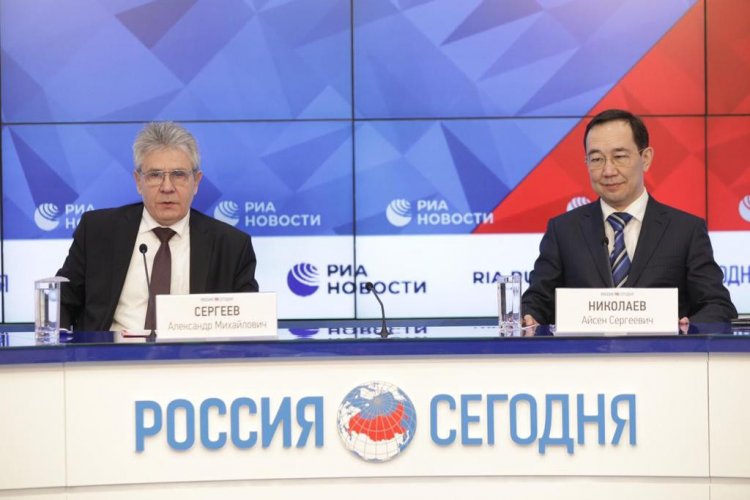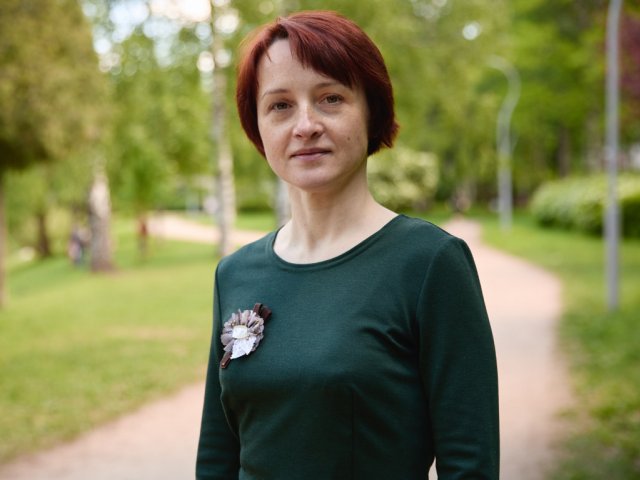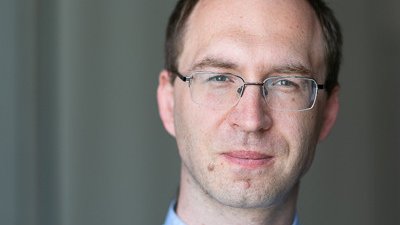On April 2, 2021, at 11:00 a.m., President of the Russian Academy of Sciences Alexander Mikhailovich Sergeev held an online press conference at the International Multimedia Press Center of Rossiya Segodnya International Information Agency. Head of the Republic of Sakha (Yakutia) Aysen Sergeyevich Nikolayev also participated in the press conference.
The subject of the conference was “The Russian Academy of Sciences and the Scientific and Technological Future of Yakutia.”
President of the Russian Academy of Sciences A. M. Sergeev visited Yakutia at the end of March. The last time a President of the Russian Academy of Sciences came to Yakutia was 25 years ago (Academician Yu. S. Osipov). A. M. Sergeev talked about his unique impressions in this remote Russian republic, what surprised and pleased him.
- The rebirth of Tiksi: the construction of a new spaceport.
- The wealth of Yakutia is the cold, thanks to which the oldest artifacts have been preserved. 75% of all known mammoth burials have been found in the bowels of Yakutia, which today have become the object of biological and paleogenetic research. Scientists of Yakutia for the first time grew grass, the seeds of which were found in the remains of mammoths.
- Yakutia as a model of the revival of the cultural code of nationalities and five ancient languages.
- The world’s largest diamond deposits: 82% of all Russian reserves. There are 47 deposits in total. Popigai impact diamond deposit: a trillion carats that were formed in Yakutia 35 million years ago.
- Yakutia as a testing ground for the creation of the latest energy.
- The transformation of Yakutia into a defensive outpost in the north of Russia.
The leadership of the Russian Academy of Sciences and the Government of Yakutia have worked out in detail promising areas of cooperation:
● Technologies for the Arctic: the role of the North Scientific and Educational Center that will unite the scientific resources of five regions of the Far East.
● The Yakut cold and permafrost as conditions for world-class scientific projects: “Doomsday Storages” (cryopreservation of plant seeds) and the Mammoth World Center.
● Research projects in the field of genomic research, cellular and agro-biotechnologies.
● Scientific and practical support for the development of linguistic and cultural diversity of the Arctic and Subarctic of the Russian Federation, including through digitalization of the linguistic and cultural heritage of indigenous peoples.
It is planned to organize a large expedition to Yakutia. The first was in 1736, the last – in 1925, under the guidance of the famous mineralogist academician A.E. Fersman.
Scientific Russia conducted a live broadcast of the press conference.
11:05 - the participants of the online press conference, the President of the Russian Academy of Sciences Alexander Sergeev and the head of the Republic of Sakha (Yakutia) Aysen Nikolayev, are welcomed by the moderator of the conference.
11:09 - Alexander Sergeev talks about the interaction of the Russian Academy of Sciences and Yakutia: “It seems to me that in terms of such visits-expeditions there is a very good story of how the Russian Academy of Sciences interacted with Yakutia.”
11:12 - “In 1925, for the first time, the question of minerals that could be found in Yakutia was raised, questions were raised from the side of medical science and the study of the state of the population and the organization of proper medical care,” A. Sergeev talks about the first scientific expedition to Yakutia.
11:15 - Alexander Sergeev notes that in the new Russia, the issue of resuming expeditions was raised in 1996 by the President of the Russian Academy of Sciences.
11:17 - “Now, together with the leadership of the republic, we are setting the task for Yakutia to turn from a geographically significant area into a significant area precisely from the viewpoint of scientific and technological advancement, and there are many reasons for this.”
11:19 - Head of Yakutia Aysen Nikolayev thanks the President of the Russian Academy of Sciences for the visit: “In fact, it is a matter of great respect that Alexander Mikhailovich found time in a series of global issues of fundamental science and we had such an interesting and serious discussion.”
11:21 - Aysen Nikolayev notes that there has not been such a big meeting in Yakutia recently.
11:23 - the moderator asks several questions: “Is there any understanding on the timing associated with new expeditions? Is there any support from the federal center? What tasks will be set during the first expedition?”
11:25 - the President of the Russian Academy of Sciences says that the issue with federal centers is questionable, but also notes that it is now possible to attract funds from interested companies.
11:26 - participants discuss the wealth of Yakutia’s deposits, which can attract business companies to finance expeditions engaged in their search.
11:29 - A. Sergeev talks about the Popigai deposit – the one and only deposit of technical diamonds in the world.
11:32 - “From the viewpoint of science, it’s beautiful. Diamonds have high technical characteristics. And there is already interest from large companies to support the expedition this year.”
11:34 - A. Sergeev notes that in terms of the rare earth industry, the situation in Russia is difficult. “To export raw materials instead of high-value-added products is wrong.”
11:36 - the President of the Russian Academy of Sciences talks about the new deposits of Yakutia, exceeding the reserves of the largest deposits in the world.
11:38 - Alexander Sergeev notes that the issue of fuel and energy is also relevant for upcoming expeditions.
11:39 - “In some situations, if we see that it will bring economic benefits, it may be correct to use traditional fuels,” comments the President of the Russian Academy of Sciences.
11:42 - the head of Yakutia talks about financing 60 million rubles from the regional budget for the implementation of subprograms that were agreed with the Russian Academy of Sciences.
11:43 - “Within the framework of government contracts, such complex issues that will be covered by these expeditions cannot be solved,” notes Aysen Nikolayev.
11:44 - The head of Yakutia talks about nuclear power and the first low-power ground plant: “Such a plant will provide many villages with energy and increase the standard of living of people who now live in the most difficult conditions.”
11:46 - the question of scientists’ work with mammoths is raised.
11:49 - “I am one of those people who believe that mammoths can be cloned. Maybe we’ll see live mammoths walking on the tundra. But at the same time, today, the mammoth potential has a clear monetized value. The Mammoth Forum and the creation of the Mammoth World Center is a desire to turn this subject into the tourist project of Yakutia,” says Aysen Nikolayev.
11:50 - He also notes the need to adopt a law that regulates the extraction of mammoth bone.
11:52 - “Yes, we want to consolidate everything related to that,” Aysen Nikolayev sums up the question about mammoths.
11:53 - The President of the Russian Academy of Sciences talks about the successful experience of regeneration of a flower of paleontological fauna.
11:54 - “Why do they say it’s impossible to clone? The fact is that when the tissues of animals and plants freeze, the water turns into ice, and it expands in volume. Due to this, the rupture of tissues and molecules occurs. But experiments with plants have shown the opposite. They need to be continued,” the President of Yakutia noted.
11:56 - the moderator raises the issue of temperature rise and climate change
11:57 - “Yakutia and its cold weather are actually the ‘kitchen’ of the weather. It is now clear that the causes of climate change are mainly anthropogenic. But the processes in nature are already changing. The melting of the Arctic leads to more warming of the Earth. The question of greenhouse gases already arises here. The process that started anthropogenically is picked up by nature and we can enter such a situation that no matter how we try to fulfill the Paris Agreement, nature itself will increase the temperature of the planet. Therefore, the cold of Yakutia is a scientific wealth,” says the President of the Russian Academy of Sciences.
12:02 - Alexander Sergeev also notes that the permafrost of Yakutia is the preservation of the plant gene pool in case of cataclysms.
12:03 - The President of the Russian Academy of Sciences emphasizes the importance and naturalness of doing such a “cold” science in Yakutia.
12:06 - “There is another important aspect of the development of science in Yakutia – the new materials that work in conditions of cold and Arctic loads. In Yakutia, this cold exists, and the testing and operation of these new materials are carried out in natural conditions. This direction is now well represented at the Ammosov North-Eastern Federal University. And I like the proposal to make a testing center for new materials in Tiksi,” says Alexander Sergeev.
12:07 - The President of the Russian Academy of Sciences notes that the consolidation of permafrost is possible.
12:08 - The head of Yakutia talks about the North Research and Education Center, to which Kamchatka, Chukotka, Magadan, and Sakhalin have joined.
12:10 - “Comprehensive scientific support must go throughout this vast territory, which has features and unique things that can advance Russian science to the forefront in the world.”
12:12 - Aysen Nikolayev notes that Yakutia is the only region where the law on the preservation of permafrost has been adopted. He argues that it is extremely important to adopt such a law in other regions as well.
12:14 - Moderator raises the issue of the development of the space industry of Yakutia.
12:15 - “Tiksi has been getting a new breath in recent years. With the support of governments at different levels, all plans and projects for its development can be implemented,” the head of Yakutia notes.
12:16 - “As for space, in addition to Tiksi, we have the Vostochny cosmodrome, where rockets are also launched. In these conditions, we need to train specialists and we have started working on this.”
12:18 - Alexander Sergeev talks about the revival of Tiksi.
12:22 - “Tiksi now gives the impression of a deserted city. In the 70s and 80s, Tiksi was the capital of the Soviet Arctic, and then the outflow of people began, the military left. This did not serve as a positive development moment. Now we see abandoned five-story houses, but the manifestations of the new are also visible. It’s good that Tiksi will now be developed from all sides. Developing from the scientific side is also no less important,” Alexander Sergeev notes.
12:24 - The President of the Russian Academy of Sciences talks about the promising development of wind and diesel energy in Yakutia. He also notes the importance of the development of hydrogen energy.
12:25 - “The area of very strong winds in the Arctic, where there is a lot of such energy, could be at the center of the modern trend of transferring the world’s industry to hydrogen energy,” A. Sergeev comments.
12:26 - The live broadcast is over.
The broadcast is complete. Thank you for being with us!






















